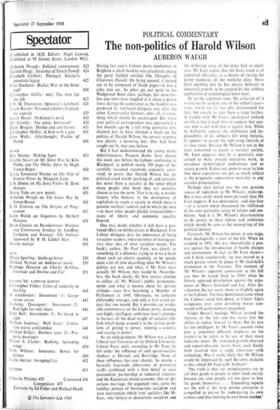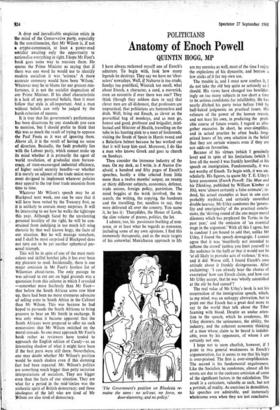The non-politics of Harold Wilson
POLITICAL COMMENTARY AUBERON WAUGH
During last year's Labour party conference at Brighton a small booklet was circulated among the party faithful entitled The Thoughts of Chairman Harold. On being opened, it turned out to be composed of blank pages—it was a joke, you see. As jokes go, not quite in the Wedgwood Berm class, perhaps, but neverthe- less one must have laughed at it about a dozen times during the conference as the booklet was produced by red-faced delegates one after the other. Conservative humour, after all, is some- thing which should be encouraged. But when your political correspondent was approached a few months ago by a left wing journalist who claimed just to have finished a book on the politics of Harold Wilson, the correct response was plainly a knowing leer. One had been caught out by that one, before.
But I had underestimated the young man's industriousness. Penguin Books have chosen this week, just before the Labour conference at Blackpool, to publish nearly 350 pages of his carefully reasoned argument, copiously anno- tated, to prove that Harold Wilson has no political creed worth speaking of, and certainly has never been a socialist in the sense which many people who think they are socialists choose to use the term. That is to say, a revolu- tionary who believes in the destruction of capitalism to create a society in which there is genuine workers' control and in which the twin —to most other people plainly irreconcilable— states of liberty and economic equality flourish.
One may doubt _whether it will have a pro- found effect on deliberations at Blackpool. Few Labour delegates give the impression of being voracious readers, and even fewer of having any very clear idea of what socialism means. The book's author, Mr Paul Foot, was clearly in something of a dilemma trying to write a book about such an elusive quantity, so he spends quite a lot of time describing what Mr Wilson's politics are not, and what, if Mr Foot were actually Mr Wilson, they would be. Neverthe- less, the book marks the first serious attempt to collate all Mr Wilson's public pronounce- ments and what is known about his private attitudes since first becoming a Member of Parliament in 1945. Obviously, no coherent philosophy emerges, and only a fool could ex- pect that one would. But it provides an invalu- able commentary on the Labour party, showing one highly intelligent, ambitious man's attempts to harness all the dead weight of socialist rub- bish which hangs around it to the serious prob- lems of getting to power, running a country and staying in power.
As an undergraduate, Mr Wilson was a keen Liberal and Treasurer of the Oxford University Liberal Party until, according to Mr Foot, he fell under the influence of such quasi-socialist thinkers as Disraeli and Beveridge. None of these influences has ever abated: he retains a basically free-trade abhorrence of protective tariffs combined with a firm belief in state paternalism, partnership in industrial relations and the Keynesian mixed economy. Out of this curious marriage, the argument runs, came the familiar pattern of bureaucratic socialism and state intervention which 'true' socialists like Mr Foot, who believe in democratic socialism and the withering away of the state, find so repul- sive. Mr Foot argues that his basic creed is of industrial efficiency, as a means of raising the living standards of the working class. More than anything else he has always believed in industrial growth, to be secured by the ruthless application of technological know-how.
Or so the argument runs. My criticism of it would not be to deny any of the author's asser- tions, which are far too ably documented for that, but merely to take them a stage further. A trouble with Mr Foot", ideological outlook on life is that it leads him to suppose that any- one who is not with him is against him. While he brilliantly exposes the shabbiness and im- plausibility of his subject's left wing rhetoric, he appears to accept the right wing rhetoric at its face value. Because Mr Wilson is not in the least concerned to create a socialist society, Mr Foot supposes that he is genuinely con- cerned to make private enterprise work, to introduce technological innbvations and to secure growth. It does not seem to occur to him that these aspirations are just as much subject to the pragmatic, opportunist mentality as any socialist protestations.
Perhaps class hatred was the one genuine source of radicalism in Mr Wilson's make-up. But it was surely much more personal than Mr Foot suggests. It was detestation—and also fear —of a system which threatened the fulfilment of his own particular array of talents and am- bitions. And it is Mr Wilson's determination to do justice to these talents and ambitions which should be seen as the mainspring of his political identity.
Certainly, Mr Wilson has never, at any stage, been ideologically a man of the left. When he resigned in 1951, this was theoretically a pro- test against the introduction of health charges and rearmament. In fact, as Mr Foot shows— and I think conclusively—he was moved to a much greater extent by pique at Mr Gaitskell's promotion to the Treasury. The moment of Mr Wilson's apparent conversion to the left can thus be traced back to 1949, when he bitterly opposed devaluation against the argu- ments of Messrs Gaitskell and Jay. After de- valuation, his star never shone so brightly again in the Cabinet. The finai humiliation came when the Cabinet voted him down, at Chuter Ede's instigation, over some drivelling matter con- nected with parliamentary procedure.
Under Bevan's tutelage, Wilson learned the rhetoric of the left and has never lost the ability to endear himself to them. But he was far too intelligent, by Mr Foot's account (who puts a somewhat different emphasis on the matter) to be taken in by any of their more ludicrous tenets. He remained growth-obsessed and export-obsessed. insists Foot, until finally both resolved into a single obsession—with technology. Was it really likely that Mr Wilson would be impressed by such Bevanite dialectic as this, which Mr Foot calls 'brilliant': 'The truth is that our manufacturers try to sell their goods to people in other lands merely because our own people are too poor to buy the goods themselves. . . . Expanding exports are the will o' the wisp private enterprise is compelled to pursue by underpaying its own workers and thus limiting its own home market.' A deep and ineradicable suspicion exists in the mind of the Conservative party, especially in the constituencies, that Mr Wilson is, if not a crypto-communist, at least a power-mad socialist awaiting only the opportunity to nationalise everything in sight. I hope Mr Foot's book goes some way to reassure them. He quotes the Prime Minister as saying that if there was one word he would use to identify modern socialism it was 'science.' A more accurate summary would have been 'Wilson.' Whatever may be to blame for our present mis- fortunes, it is not the socialist dogmatism of our Prime Minister. If his chief characteristic is a lack of any personal beliefs, then it must follow that style is all-important. And a man without beliefs can only be judged by the harsh criterion of success.
It is true that his government's performance has been disastrous by any standards you care to mention, but I should prefer to think that this was as much the result of trying to appease the Paul Foots as it was of ignoring them. Above all, it is the result of having no sense of direction. Basically, the fault probably lies with the Labour party, which cannot make up its mind whether it is primarily the agent of world revolution, of gradualist state bureau- cracy, of state-encouraged industrial efficiency, of higher social security benefits—or whether it is merely an adjunct of the trade union move- ment designed to implement whatever policies may appeal to the top four trade unionists from time to time.
Whatever Mr Wilson's speech may be at Blackpool next week, one can be sure that it will have been vetted by the Treasury first, so it is unlikely to contain many surprises. It will be interesting to see how he walks the tightrope this year. Although faced by the unrelenting personal hostility of the right, he will be con- strained from indulging in too much left wing rhetoric by that well known bogy, the facts of our situation. But he will manage somehow, and I shall be most surprised if Blackpool does not turn out to be yet another ephemeral per- sonal triumph.
This will be in spite of one of the most meti- culous and skilful hatchet jobs it has ever been my pleasure to read. Incidentally, there is one major omission in Mr Foot's fearless list of Wilsonian about-turns. The only passage he was advised to cut out on legal grounds was a quotation from this column in which I revealed —somewhat more fearlessly than Mr Foot— that before the South African arms row blew up, there had been no more strenuous advocate of selling arms to South Africa in the Cabinet than Mr Wilson. This was because he had hoped to persuade the South Africans to bring pressure to bear on Mr Smith in exchange. It Was only when it became apparent that the South Africans were prepared to offer no such concessions that Mr Wilson switched on the moral crusade. So one must approach Mr Foot's book rather as reviewers have tended to approach the English edition of Candy—as an interesting shadow of what it might have been if the best parts were still there. Nevertheless, one may doubt whether Mr Wilson's position would be much shaken even if this damning fact had been repeated. Mr. Wilson's politics are something much bigger than petty sectarian interpretations of socialism. They are bigger even than the facts of our situation. They are what for a period in the mid-'sixties was the authentic spirit of British democracy; and those ideologues of the left who are tired of Mr Wilson are also tired of democracy.











































 Previous page
Previous page